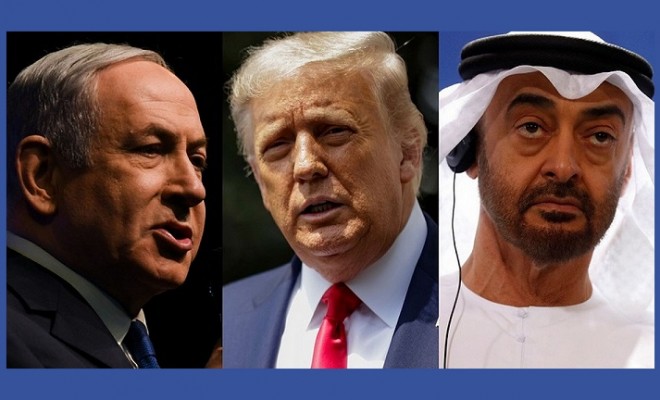
Breaking down the Israel-UAE breakthrough
President Trump surprised the world today, announcing a deal for “full diplomatic relations” between Israel and the United Arab Emirates.
Why it matters: The UAE has agreed to bring its partnership with Israel out into the open, while Israeli Prime Minister Benjamin Netanyahu has walked away from his deeply controversial pledge to annex parts of the West Bank — at least for now.
The backstory: Israel and the UAE had been covert allies for 25 years, at least in their efforts to counter Iran.
- The deal formalizes cooperation that was already taking place and also carries the prospect of deeper economic ties.
- For Israel, which has been steadily improving relations in the Gulf, it breaks a longstanding diplomatic deadlock, with the possibility of more deals to come.
- For the Trump administration, it’s a rare diplomatic victory and could offer a made-for-TV moment in an election year.
- Flashback: Previously, the only Arab countries to recognize Israel were Egypt in 1979 and Jordan in 1994.
What they’re saying: Netanyahu hailed a “new age in Israel’s relations with the Arab World,” while insisting he was “still committed to annexing parts of the West Bank.”
- Between the lines: Under fire from his right-wing base, he emphasized that he’d backed off his annexation pledge only temporarily, and at Trump’s request.
Trump insisted annexation was “off the table now,” lauding “a smart concession by Israel.”
- Among those welcoming the agreement were Joe Biden and U.K. Prime Minister Boris Johnson.
Crown Prince Mohammed bin Zayed (MBZ), the UAE’s de facto ruler, stressed Israel’s commitment on annexations while seeming to hedge slightly on normalization, saying a “roadmap” had been created.
The other side: Palestinian leaders have accused the UAE of betrayal and withdrawn their ambassador from Abu Dhabi in protest.
- They say the deal effectively accepts the status quo of Israeli occupation.
- The refusal of Arab countries to recognize Israel also provided leverage to the Palestinians, which could now slip away if more countries follow the UAE.
What to watch: Jared Kushner, who helped broker the deal, says he expects more countries to normalize ties with Israel, perhaps within days.
- Israel and the UAE will now hold direct talks on a series of agreements foreseen in the statement — opening embassies, allowing direct flights and deepening commercial ties.
- Trump hopes to hold a signing ceremony at the White House soon, with Netanyahu and a senior Emirati official attending.
Behind the scenes: How the deal came together
The breakthrough came two months ago, White House officials tell Axios contributor Barak Ravid.
Behind the scenes: Talks had been ongoing for more than a year, but they gained new urgency ahead of Netanyahu’s July 1 deadline to move ahead on West Bank annexations.
“We have been talking to both sides for 18 months but the annexation issue created the atmosphere which was conducive for getting a deal.”
— Senior U.S. official
Flashback: The UAE issued strong public statements opposing Israeli annexation, and privately stressed that it would be disastrous for Israel’s hopes of normalization with the Gulf states.
- The most important development was an op-ed in the Israeli press in which UAE Ambassador Yousef al-Oteiba stressed that Israel had to choose between normalization and annexation.
- At the end of June, al-Oteiba approached Kushner and White House envoy Avi Berkowitz with a proposal: the UAE would agree to normalization with Israel in return for an Israeli announcement that West Bank annexation was off the table.
- Kushner liked the proposal, and Berkowitz began attempting to lay the groundwork.
The White House also had its own reservations about annexation, which Berkowitz discussed with Netanyahu in meetings over three days in late June.
- The White House demanded that if Israel move ahead with annexation, it also take steps supported by the Palestinians, like transferring control of 5%-10% of the West Bank.
- Netanyahu didn’t like what he heard. Sources briefed on the meetings say he was upset by the proposals.
- It was also becoming clear to the White House that Israeli leadership was divided on annexation.
- Berkowitz proposed an alternative to annexation: the UAE normalization idea. Netanyahu said he was willing to consider it.
In the seven weeks that followed, momentum grew.
- Kushner spoke several times with MBZ, and he and Berkowitz had at least two dozen meetings with Israel’s ambassador to Washington, Ron Dermer, and his Emirati counterpart, al-Oteiba.
Several days ago, an agreement was reached in principle but kept secret even from top Israeli officials.
- The deal was finalized on Wednesday in a conference call between President Trump, Netanyahu and MBZ.
- Trump today described that phone call as “like love.”
Πηγή: axios.com




